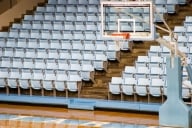You have /5 articles left.
Sign up for a free account or log in.

iStock
The drumbeat of colleges and athletic conferences forgoing fall sports continued Monday, with the Patriot League announcing its member institutions would not participate in sports competition this fall.
The U.S. Naval Academy and the U.S. Military Academy at West Point are among 10 full-member institutions in the National Collegiate Athletic Association Division I Patriot League. Georgetown University and the Massachusetts Institute of Technology are among the league's four associate members. Citing unique aspects of the Naval Academy and West Point, the conference said in a statement that those two institutions "may continue to engage in competitive opportunities."
The league said it would make decisions about winter and spring competition at a later date.
"The collegiate athletics experience at all Patriot League institutions is valuable to fulfilling our educational and developmental missions, and the League recognizes that any degree of non-competition this fall is deeply disappointing to our student-athletes, coaches and fans. However, the health and safety of our campuses and communities must be our highest priority," the Patriot League said.
Also on Monday, Hampton University suspended all of its fall sports. The historically Black college in Virginia said if conditions permit, it would bring back winter and spring sports in the spring term.
Greg Sankey, commissioner of the Southeastern Conference, a Power Five conference that has long had the most success in football, over the weekend told ESPN Radio that he is concerned about the fall season. "We are running out of time to correct and get things right," Sankey said, "and as a society we owe it to each other to be as healthy as we can be."
The Pacific-12 Conference announced Friday that it would only schedule in-conference athletic events this fall for football, men’s and women’s soccer, and women’s volleyball. Later that day the conference said its commissioner, Larry Scott, had tested positive for COVID-19 and was self-quarantining, ESPN reported.
***
The Washington Post on Monday published an investigation on the ability of college health centers to adequately care for students this fall. The newspaper reviewed medical records, court documents and reviews of health centers for the project, while interviewing more than 200 students, parents and health officials.
The investigation found that colleges appear unprepared to handle the pandemic. Students reported waiting days or weeks for appointments and routinely received lackluster care. Dozens have been hospitalized for mistakes they said were made at student health centers. The risks were most substantial at historically Black colleges, the newspaper said, which often have fewer resources and typically lack a full-time staff physician.
In addition, some students can't afford care at campus health centers, according to the newspaper, while budget cuts and pandemic pressures have strained resources at campus medical clinics.
***
Rice University is developing nine large outdoor classrooms, The New York Times reported. Five of the classrooms are open-sided circus tents the university is buying, the newspaper reported. The other four are semipermanent structures Rice, which is located in Houston, is building on an open field near residence halls. Students and faculty members will decorate the new classroom facilities with murals and video projections.
Kevin Kirby, the university's vice president for administration, told the newspaper the new classrooms are a "statement to the community" that Rice is creative, resilient "and what we do matters."
***
Newly released results of a survey of roughly 70 college and university leaders found widespread concern about whether students, particularly undergraduates, would practice social distancing on campus. The survey was conducted in June by EAB, an education consulting firm. Many respondents said they were still considering how to discipline students who do not comply, and how to ensure consequences are enforced equitably.
About three-quarters (72 percent) of the college leaders said their greatest concern was getting students to follow social distancing guidelines in residence halls and other on-campus housing. Their second-biggest concern (57 percent) was compliance in on-campus common areas, followed by those who were concerned (52 percent) about whether students would follow safety measures while off campus.
"Enforcing social distancing in classrooms, libraries and other public spaces won’t be easy, but schools know they will have little to no control over whether students adhere to safety guidelines when they go off campus or in private spaces in residence halls," Liz Rothenberg, a managing director at EAB, said in a written statement.








